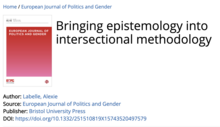Paru dans le European Journal of Politics and Gender, l’article de la doctorante Alexie Labelle (CPDS) porte sur les enjeux épistémologiques et méthodologiques intersectionnels de la science politique.
SYNOPSIS : Since its academic introduction in the late 1980s, the concept of intersectionality has made a staple contribution to feminist scholarship. However, its institutionalised popularity and apparent depoliticisation have led scholars to raise two major concerns: the lack of a clearly defined intersectional methodology; and the erasure of black women scholars in intersectionality scholarship, particularly in the discipline of political science. While the latter rightly addresses epistemology and the politics of knowledge production, the former has lacked a thorough discussion on the ways in which epistemology impacts intersectional methodology, focusing instead on methods and method choice. Drawing on my own experience studying lesbian, gay, bisexual, trans* and queer people of colour activism in Canada, I argue that we need to bring epistemology into intersectional methodology. Hence, this article demonstrates how reflecting on one’s positionality, one’s embodiment of privileges and one’s ethical responsibilities informs the ways in which researchers operationalise intersectional projects, thereby shaping methodology.
